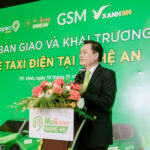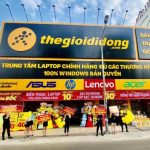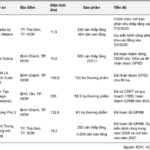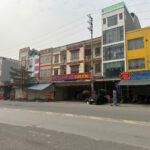
Host Đăng Việt and journalist Khuất Thế Đạt discuss the following topic: Can BYD, the world’s number one electric vehicle manufacturer, achieve the same success in Vietnam?
BYD is currently the world’s leading electric vehicle manufacturer. Do you think they can replicate this success in Vietnam?
While BYD is the top electric vehicle brand globally, their success in Vietnam is not guaranteed. Every market, including Vietnam, has its unique characteristics.
In a recent article discussing BYD’s entry into the Vietnamese market, I mentioned three potential challenges they may face: consumer psychology, direct competition with a domestic brand, and pricing.

Regarding consumer psychology, which you mentioned earlier, I’ve noticed that a significant number of customers have concerns about charging BYD electric vehicles. What are your thoughts on this issue?
During the announcement of BYD’s official entry into Vietnam, the company expressed confidence in their ability to address charging station concerns. However, I disagree with this perspective.
Public charging infrastructure in Vietnam is still underdeveloped. Currently, VinFast is the only company actively installing public charging stations, and they have no incentive to share this competitive advantage with rivals.
While BYD has offered portable and wall-mounted chargers for home use, I believe there are several drawbacks to this approach. The portable charger has a low power output of around 7kW, resulting in lengthy charging times.
BYD suggests that vehicle owners can charge their cars at cafes, but this relies on the cafe owner’s agreement and the availability of suitable space. Additionally, BYD plans to collaborate with third parties to install home charging stations, but even with this option, charging a BYD Dolphin to full capacity would take 11 to 12 hours, which is highly inconvenient.
Furthermore, installing a home charging station requires a switch to three-phase power, and not everyone has the necessary space or financial means to accommodate this. As a resident of an apartment building, I can charge my electric vehicle in the basement, but this raises concerns about fire safety and other issues.

To address customer concerns, BYD has claimed that their electric vehicles can travel several hundred kilometers before needing to be recharged. Do you think this range is sufficient to satisfy customers in the absence of a public charging network?
I believe this is more of a theoretical claim, and the actual user experience may vary. BYD states that their vehicles can travel approximately 400 kilometers on a single charge. However, they offer only three charging options: portable chargers, home charging stations, and charging at showrooms.
Currently, BYD has 13 showrooms in Vietnam and plans to expand to 20 by the end of the year. For instance, if I were to drive from Hanoi to Vinh (Nghe An), approximately 300 kilometers away, there would be a showroom with a charging station. But if I wanted to travel further, the showroom charging stations would be too sparsely located.
In contrast, VinFast offers a denser network of charging stations at shopping malls, gas stations, and rest stops, giving them an advantage over BYD.
Aside from the charging infrastructure challenge, BYD’s pricing strategy doesn’t seem to offer any surprises. Do you think this could be a significant obstacle for the Chinese brand?
I believe this is a deliberate strategy on BYD’s part, and they have likely planned it in advance.
In my opinion, the three BYD models demonstrate a high level of refinement. The BYD Seal, in particular, offers an impressive driving experience, while the Atto 3 falls slightly short. Their pricing strategy seems to be a deliberate choice to position themselves in the higher-end segment, with plans to gradually reduce prices over time.

In Thailand, BYD faced a backlash from existing customers due to frequent price reductions. Do you think they will repeat this strategy in Vietnam?
I believe that if BYD were to implement drastic price cuts similar to those in Thailand, the Vietnam Competition and Consumer Protection Authority would intervene. Moreover, policymakers would likely establish barriers to prevent such practices.
BYD has confirmed its participation in the Vietnam Motor Show 2024 and will introduce additional products. What are your expectations for the brand at the exhibition and in the future?
We know that Chinese companies, especially in the electric vehicle industry, work at an incredibly fast pace. BYD’s simultaneous introduction of three electric vehicle models in Vietnam is a testament to this. By October, they plan to add three more models, bringing their total to six, which is on par with VinFast’s current lineup of seven vehicles.

BYD has also rapidly expanded into markets like Europe and Southeast Asia through unique strategies. In Singapore, they opened two BYD restaurants, offering dining experiences alongside electric vehicle test drives. In Europe, they set up shops in popular shopping malls alongside well-known fashion brands.
These unconventional approaches in the automotive industry make it challenging for those of us in the media to predict BYD’s next move in Vietnam. All we can do is wait and see what they do and whether they can achieve the number one position in the Vietnamese market.
Thank you for your insights!
The Trên Ghế program is a collaboration between Ho Chi Minh City Television Station and VCCorp; with AutoPro as the implementing partner, AdWheel as the commercial operator, and Giovanni as the companion.
The most extensive bribery case ever in Thanh Hoa: Numerous suspects prosecuted for “Giving and Receiving Bribes”
The Provincial Security Investigation Agency (PSIA) of Thanh Hoa province announced on January 31st that it has made the decision to initiate a prosecution against 23 individuals in connection with the offenses of “Accepting bribes” and “Giving bribes” as stipulated in Article 354(3) and Article 364(2) of the Criminal Code.
Largest taxi company in Nghệ An cancels car purchase contract with Toyota to switch to VinFast
Mr. Ho Chuong, CEO of Son Nam International Transport Co., has recently disclosed that he had previously signed contracts to purchase gasoline-powered vehicles from a Japanese car manufacturer. However, he has since diversified his investment portfolio by also venturing into VinFast electric vehicles, in order to embrace long-term and sustainable development.





















